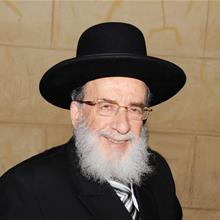
Religion

Parshat Nitzavim
RABBI TZADOK SUCHARD
Forgive and be forgiven
One of the classical stories which brought about the destruction of the Temple in Jerusalem was that of Kamtza and Bar Kamtza. A wealthy Jew was making a wedding and he sent his messenger to invite Kamtza, his good friend.
The messenger made a mistake and invited Bar Kamtza, an enemy of the host. The host was appalled to see him and asked him to leave. Bar Kamtza was embarrassed and offered to pay for his portion, even half the wedding and even the entire affair.
However, to no avail, and he was thrown out. Bar Kamtza went to the authorities and said that the Jews were rebelling against the king. This led to the burning of the Temple in the year 70 CE, 2 000 years ago.
If Bar Kamtza turned up to the feast of his enemy; he must have decided that the host wanted to bury the hatchet! Imagine that he was so willing to make up that he swallowed his pride, brought a present, and then was told to leave.
The host was not prepared to forgive. He was so embittered, and this was more important to him. If only the host would have accepted Bar Kamtza’s desire for peace, and forgave. Tisha B’Av would never have occurred.
During these days the High Holy Days when our futures are balanced, should we not forgive when asked to do so?
The mitzvah of the day, the mitzvah to show G-d remorse is repentance.
Repentance is not only to say that I am sorry, but also to forgive, which may be even more difficult. A commentary to this story in the Talmud explains that the host who refused to accept Bar Kamtza was also the cause for the destruction of the Temple. We appeal to Hashem to forgive, therefore we too must practise this noble trait. (Maharsha).
During this past year I went to the Shiva house of the owner of a kosher food shop. The visit was at a time when he was alone. He said to me: “Rabbi, let me tell you what I did after my father died. My sister and I have not spoken in years. I phoned her and said: ‘Our father is not alive, our mother lives overseas, we are left alone, meet me for a cup of coffee.’ We met and made up. Our children now play together, and I feel so good!”
This true story says it all. To forgive and make up actually brings a healing to one’s soul, and this is what Hashem wants from us. This trait unifies families and the community.
May we all be signed and sealed for a prosperous New Year, with good health and happiness.




